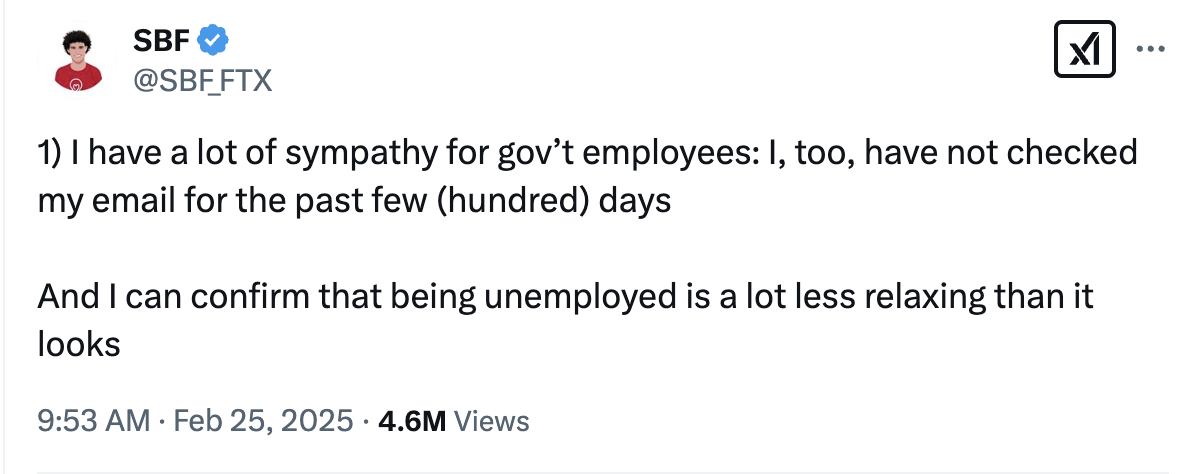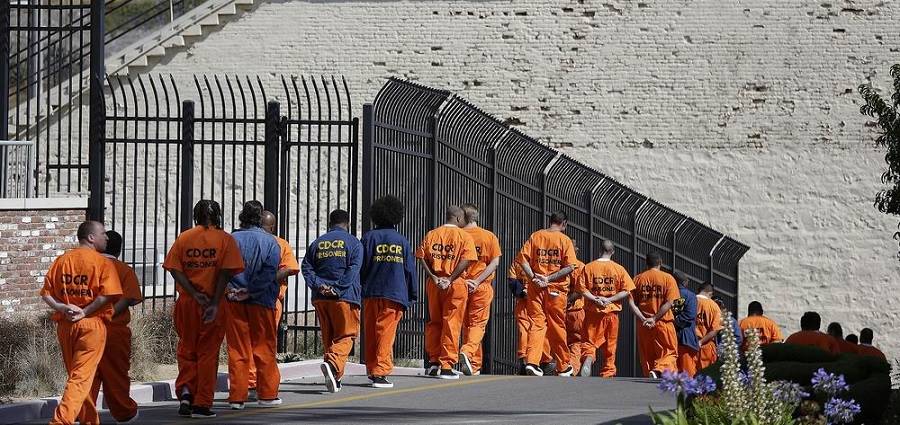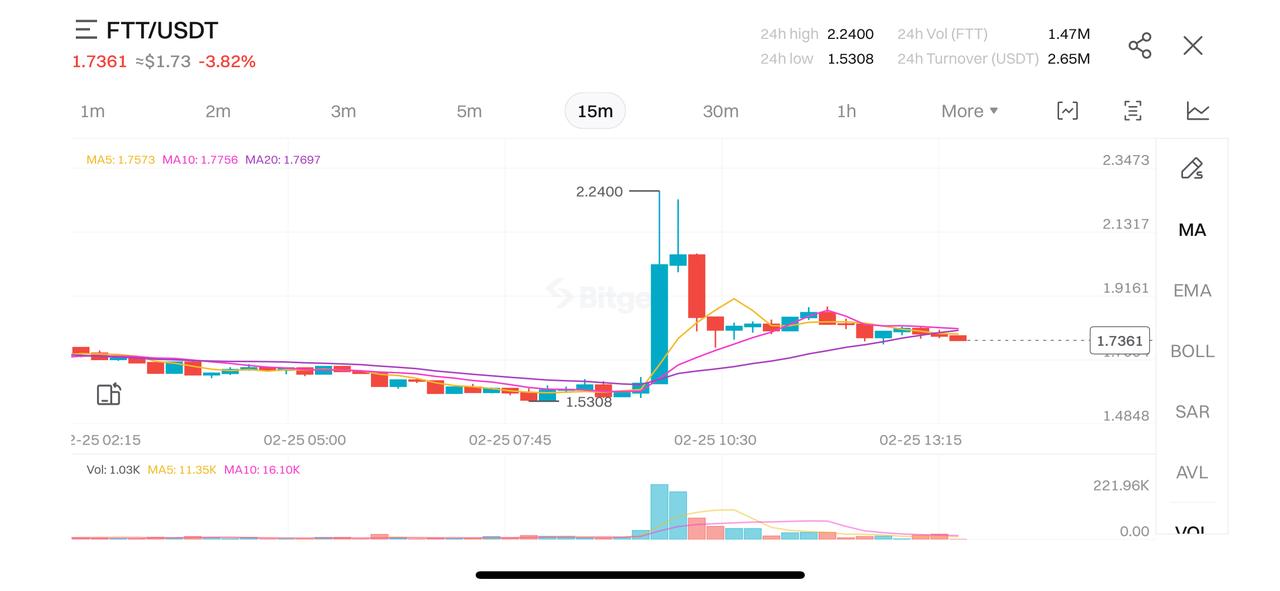Can inmates in U.S. federal prisons use mobile phones?
Written by: Alex Liu, Foresight News
SBF Tweets After Two Years, Related Tokens Surge

On February 25, Sam Bankman-Fried (SBF), sentenced to 25 years in prison due to the FTX collapse case, suddenly posted a new update on his personal Twitter account, expressing sympathy for government employees who were laid off. This was the first post on X from this account since January 2023. Although the content was unrelated to cryptocurrency, SBF's update still triggered a nearly 40% surge in the former FTX platform token FTT (which has since significantly retraced) and a spike in related meme coins like SBF.
SBF was arrested in the Bahamas in December 2022, extradited to the U.S. in August 2023, found guilty of fraud in November of the same year, and was officially incarcerated at the Brooklyn Metropolitan Detention Center in New York in March 2024 (he may have been temporarily held there prior). On May 22, 2024, The Wall Street Journal reported that he would be transferred from the Brooklyn Metropolitan Detention Center to the Federal Correctional Institution Mendota in California. This prison is only 200 kilometers from his parents' home.
Is SBF using a mobile phone in prison to send out this tweet that stirred the market? The situation is actually quite complex.

Before discussing individual cases, it is essential to understand a general background: how many years a U.S. inmate sentenced to 25 years for financial fraud actually has to serve.
According to former federal prosecutor Mitchell Epner, under normal circumstances, SBF's minimum time served would be 12.5 years, primarily due to two forms of sentence reduction. First, inmates in the U.S. federal prison system can earn up to 54 days of sentence reduction per year for good behavior, which amounts to a 15% reduction.
More importantly, the U.S. Congress passed the First Step Act in 2018, which allows non-violent federal inmates to reduce their sentences by up to 50%. Although this act was promoted as a means to help minority offenders convicted of non-violent drug offenses, it has also become a benefit for white-collar criminals.
Finally, the U.S. judicial system allows courts to release inmates early for very significant reasons (usually health issues). Since the COVID-19 pandemic, U.S. courts have been more willing to use this provision to release inmates who have been incarcerated for a long time.
However, SBF is certainly still in prison.
The Mobile Phone Ban in Federal Prisons: Explicit Regulations and Gray Realities
According to the Bureau of Prisons (BOP) regulation 5265.11, inmates are prohibited from possessing mobile phones and other electronic devices, and can only make monitored calls through the prison's paid phone system.
But the reality is much more complex. Smuggling and black markets are rampant: The 2023 BOP annual report showed that 24,000 mobile phones were seized from inmates throughout the year, with an average of 67 devices intercepted per federal prison each month; some inmates use "special channels" to access smuggled phones at a rate of $100 per minute. Privilege loopholes: Former prison guards revealed to the New York Post that high-profile inmates often receive "special treatment" through bribery; there was a case where a mob boss paid $200,000 to a guard to obtain a phone. Lawyer communication mechanisms: In theory, lawyers can relay messages, but they are subject to strict scrutiny. In 2021, Mexican drug lord "El Chapo" Guzmán used this method to pass notes to direct his drug trafficking organization.
Two Possibilities for SBF's Tweet
This incident may have the following explanations:
Third-party account management: SBF may have entrusted his account to someone else before going to prison, perhaps his team or family.
Ross, the founder of the Silk Road dark web platform, was sentenced to life imprisonment after being arrested in 2013 but updated his Twitter account while incarcerated.
Ross could not directly use the internet in prison; he conveyed his thoughts and information through handwritten notes.
His relatives or friends would post the relevant content on his Twitter account to communicate with the outside world.
For example, on August 10, 2018, he tweeted, "Thank you all, you are amazing," along with a handwritten reply. Additionally, on April 8, 2020, he shared updates about his time in prison, stating that while he couldn't be sure if anyone in prison had contracted COVID-19, he felt good.

Prison management disorder: The Federal Correctional Institution Mendota in California, where SBF is currently located, is classified as a "low-security facility," housing only 931 inmates last year. Compared to the notorious conditions of the Brooklyn Metropolitan Detention Center where he was previously held, this may provide SBF with relatively lenient prison conditions. Additionally, since FTX was a major donor to the Democratic Party and SBF's parents are university professors, belonging to the upper echelons of society, it is possible that SBF has indeed become a "privileged inmate" who can obtain a mobile phone in prison.
The Absurd Fable of the Crypto World

The market fluctuations triggered by SBF's tweet once again confirm the cryptocurrency industry's sensitive reliance on symbolic narratives. Even while imprisoned, this former "crypto golden boy" can still influence capital dynamics. What is even more concerning is that when digital signals can resonate both inside and outside prison walls, it not only questions the prison management system but also serves as a dark irony of the vision of decentralization—who truly holds the boundaries of technological empowerment?
免责声明:本文章仅代表作者个人观点,不代表本平台的立场和观点。本文章仅供信息分享,不构成对任何人的任何投资建议。用户与作者之间的任何争议,与本平台无关。如网页中刊载的文章或图片涉及侵权,请提供相关的权利证明和身份证明发送邮件到support@aicoin.com,本平台相关工作人员将会进行核查。



